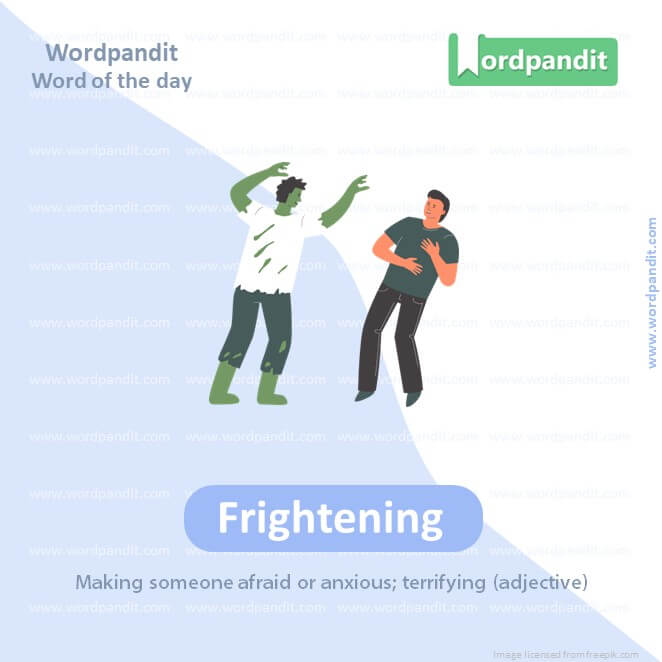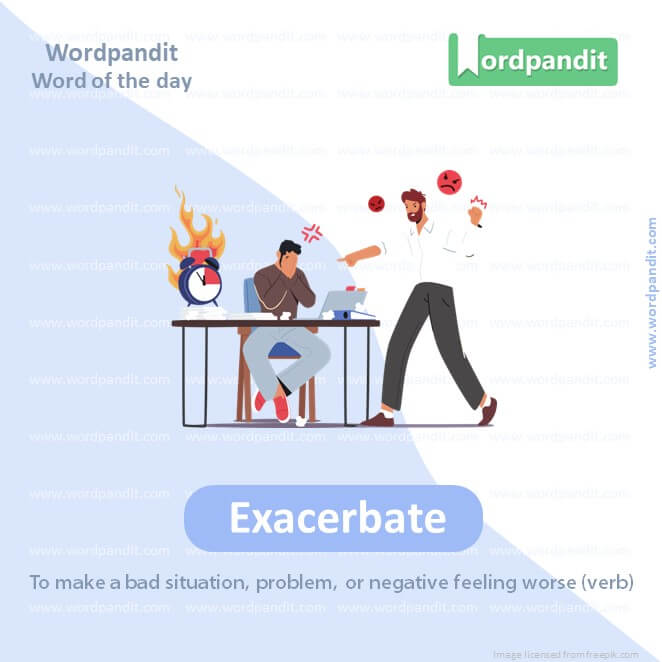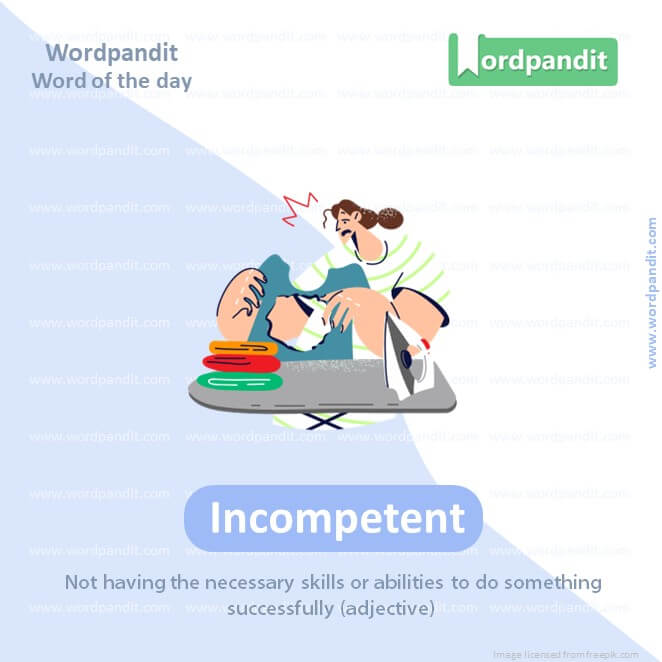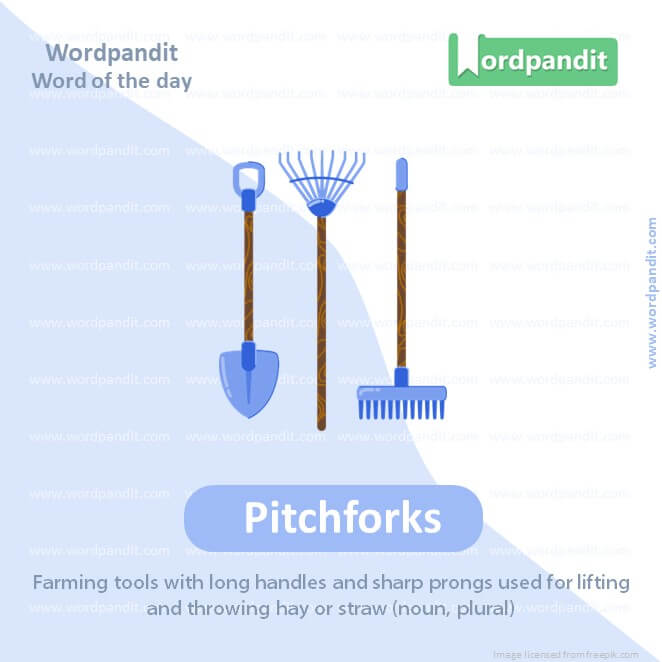Daily Vocabulary Words: List of Daily Used Words in Leading International Newspapers
Hi there. Welcome to this special section @ Wordpandit.
Our endeavour here is very simple: to highlight important daily vocabulary words, which you would come across in leading newspapers in the country. We have included the following newspapers in our selection:
• The New York Times
• The Washington Post
• Scientific American
• BBC
• The Guardian
• Psychology Today
• Wall Street Journal
• The Economist
We are putting in extensive work for developing your vocabulary. All you have got to do is be regular with this section and check out this post on a daily basis. This is your repository of words that are commonly used and essentially, we are posting a list of daily used words. Hence, this has significant practical application as it teaches you words that are used commonly in leading publications mentioned above.
Visit the website daily to learn words from leading international newspapers.

WORD-1: Frightening
CONTEXT: What is so frightening is that it is coming from everywhere — right, left, center,” she told me. “It is a most ubiquitous form of hatred, not just the oldest.”
SOURCE: Washington Post
EXPLANATORY PARAGRAPH: Frightening is like when you see something scary in a movie and it makes you jump. It means something that makes you feel scared or afraid.
MEANING: Making someone afraid or anxious; terrifying (adjective)
PRONUNCIATION: fryt-n-ing
SYNONYMS: Scary, Terrifying, Alarming, Horrifying, Spooky, Intimidating
USAGE EXAMPLES:
1. The dark forest was frightening at night.
2. He told a frightening story around the campfire.
3. The thunderstorm was frightening to the little kids.
4. She found the situation quite frightening.

WORD-2: Exacerbate
CONTEXT: in the process, to exacerbate disparities in who suffers from disease or gets cured, who lives or dies
SOURCE: Washington Post
EXPLANATORY PARAGRAPH: Exacerbate is like when you rub a spot on your arm that already hurts and it makes the pain worse. It means to make a bad situation or problem even worse.
MEANING: To make a bad situation, problem, or negative feeling worse (verb)
PRONUNCIATION: ig-zas-er-bayt
SYNONYMS: Worsen, Aggravate, Intensify, Increase, Complicate, Escalate
USAGE EXAMPLES:
1. Arguing only served to exacerbate the situation.
2. The heavy rain exacerbated the flooding.
3. His remarks exacerbated the tension in the room.
4. Ignoring the problem will exacerbate it in the long run.

WORD-3: Chaotic
CONTEXT: The ouster of Kevin McCarthy, followed by the chaotic scramble for his replacement, became a slow-rolling, breathtaking fiasco that ground the House to a halt and made the entire Republican conference look like a pack of petty, pouty, incompetent preschoolers.
SOURCE: New York Times
EXPLANATORY PARAGRAPH: Chaotic is like when your room is so messy with toys and clothes everywhere that you can’t even walk. It means being in a state of complete confusion and disorder.
MEANING: In a state of complete confusion and disorder (adjective)
PRONUNCIATION: kay-ot-ik
SYNONYMS: Disorderly, Disorganized, Confused, Turbulent, Tumultuous, Anarchic
USAGE EXAMPLES:
1. The traffic in the city was chaotic.
2. After the storm, the situation was chaotic.
3. The classroom was chaotic when the teacher left.
4. His thoughts were chaotic and jumbled.

WORD-4: Incompetent
CONTEXT: the entire Republican conference look like a pack of petty, pouty, incompetent preschoolers. Way to build the brand, guys.
SOURCE: New York Times
EXPLANATORY PARAGRAPH: Incompetent is like when someone tries to paint a picture but they keep using the wrong colors and making a mess. It means not having the necessary skills or abilities to do something well.
MEANING: Not having the necessary skills or abilities to do something successfully (adjective)
PRONUNCIATION: in-kom-puh-tuhnt
SYNONYMS: Unskilled, Inept, Incapable, Inadequate, Inefficient, Unqualified
USAGE EXAMPLES:
1. The work was done by an incompetent contractor.
2. He was deemed incompetent in his role.
3. The investigation proved the management was incompetent.
4. She felt incompetent at her new job.

WORD-5: Pitchforks
CONTEXT: Many Americans fantasize about taking up their pitchforks and storming the boss’s office.
SOURCE: New York Times
EXPLANATORY PARAGRAPH: Pitchforks are like big forks with long handles used on farms to pick up hay. They have long, sharp prongs and are used for lifting and throwing things like straw or leaves.
MEANING: Farming tools with long handles and sharp prongs used for lifting and throwing hay or straw (noun, plural)
PRONUNCIATION: pich-forks
SYNONYMS: Hayforks, Forks, Farming Tools, Agricultural Implements, Tined Tools
USAGE EXAMPLES:
1. The farmer used pitchforks to move the hay.
2. They carried pitchforks during the barn cleaning.
3. Old pitchforks were leaning against the barn wall.
4. The garden shed contained several pitchforks.
WORD-6: Defamation
CONTEXT: A respected historian and antisemitism expert who won a defamation case against Holocaust denier David Irving, Lipstadt is direct and passionate about her work.
SOURCE: Washington Post
EXPLANATORY PARAGRAPH: Defamation is like when someone tells a lie about you to others to make you look bad. It means saying false things about someone to harm their reputation.
MEANING: The act of damaging the good reputation of someone through slander or libel (noun)
PRONUNCIATION: def-uh-may-shuhn
SYNONYMS: Slander, Libel, Calumny, Vilification, Character Assassination, Disparagement
USAGE EXAMPLES:
1. The article resulted in a lawsuit for defamation.
2. He accused her of defamation of character.
3. The celebrity was a victim of media defamation.
4. She sued the newspaper for defamation.
WORD-7: Eradicated
CONTEXT: It can be fought and contained but never eradicated, in her view, because it is so “baked into” societies around the world.
SOURCE: Washington Post
EXPLANATORY PARAGRAPH: Eradicated is like when you completely clean up all the toys in your room so none are left on the floor. It means to completely get rid of something, such as a disease or a pest.
MEANING: Completely removed or destroyed; eliminated (verb)
PRONUNCIATION: ih-rad-i-kay-tid
SYNONYMS: Eliminated, Wiped Out, Exterminated, Destroyed, Abolished, Extinguished
USAGE EXAMPLES:
1. The program aimed to eradicate poverty.
2. Smallpox was successfully eradicated.
3. Efforts to eradicate invasive species continued.
4. The pests were completely eradicated from the farm.
WORD-8: Antisemitism
CONTEXT: Deborah Lipstadt is precisely the right person at the right time to serve as the Biden administration’s antisemitism envoy, especially when antisemitism is surging in the United States and around the world.
SOURCE: Washington Post
EXPLANATORY PARAGRAPH: Antisemitism is like when someone is unkind or unfair to another person just because they are Jewish. It means having negative feelings, beliefs, or actions against Jewish people.
MEANING: Hostility, prejudice, or discrimination against Jewish people (noun)
PRONUNCIATION: an-tee-sem-i-tiz-uhm
SYNONYMS: Prejudice against Jews, Jewish Discrimination, Judaophobia, Bigotry against Jews, Racial Hatred
USAGE EXAMPLES:
1. The politician was accused of antisemitism.
2. They held a rally to fight against antisemitism.
3. The history book discussed the rise of antisemitism.
4. Antisemitism is a serious social problem.
WORD-9: Utilitarian
CONTEXT: On top of that, you have people who have a utilitarian motive [to spread antisemitism],” she continued.
SOURCE: Washington Post
EXPLANATORY PARAGRAPH: Utilitarian is like when you have a backpack that has lots of pockets and places to put things. It means designed to be useful and practical rather than attractive.
MEANING: Designed to be useful or practical rather than attractive (adjective)
PRONUNCIATION: yoo-til-i-tair-ee-uhn
SYNONYMS: Functional, Practical, Useful, Efficient, Pragmatic, Serviceable
USAGE EXAMPLES:
1. The design of the building was purely utilitarian.
2. She preferred utilitarian clothes that were comfortable.
3. The kitchen utensils were chosen for their utilitarian value.
4. The furniture was simple and utilitarian.
WORD-10: Authoritarianism
CONTEXT: I began by asking whether antisemitism was increasing before Oct. 7 because of the rise of right-wing authoritarianism or whether growing antisemitism had fueled right-wing nationalist movements.
SOURCE: Washington Post
EXPLANATORY PARAGRAPH: Authoritarianism is like when a bossy person makes all the rules and doesn’t let anyone else say what they think. It means a way of governing or leading where one person or a small group has all the power and doesn’t allow much freedom.
MEANING: A form of government or leadership characterized by strict obedience to authority, often at the expense of personal freedom (noun)
PRONUNCIATION: uh-thor-i-tair-ee-uhn-iz-uhm
SYNONYMS: Totalitarianism, Dictatorship, Despotism, Tyranny, Autocracy, Oppression
USAGE EXAMPLES:
1. The book discusses the dangers of authoritarianism.
2. Many people suffered under the regime’s authoritarianism.
3. The movement was a response to rising authoritarianism.
4. He was known for his authoritarianism in management.
Vocabulary new Words
In the exuberant realm of language learning, nothing holds more thrill than the discovery of ‘vocabulary new words’. These gems of knowledge bring with them a fresh perspective and a deeper understanding of language. However, learning ‘vocabulary new words’ requires a methodical and focused approach.
The act of learning ‘vocabulary new words’ is a delve into linguistic novelty, often involving exposure to unfamiliar structures and meanings. Transcending the traditional approach of mere memorization helps in truly cementing newly learnt words into long-term memory. Interaction with a broad spectrum of written and spoken material, including novels, films, podcasts, and digital resources, provides a rich context of ‘vocabulary new words’ and significantly aids in their comprehension.
It’s noteworthy that unpacking ‘vocabulary new words’ is a steady process rather than a rushed one. A planned approach with a specific number of words, learned and reviewed each day, proves beneficial in effective learning. Coupling this method with technologies such as flashcards or memory-enhancement software can optimize the retention of ‘vocabulary new words’.
Integrating mnemonic devices and visual imagery is another highly efficient tool when learning ‘vocabulary new words’. Assigning unique stories or visuals to new words can enhance recall, making unfamiliar vocabulary much more approachable.
Lastly, practicing ‘vocabulary new words’ within daily routine is crucial for grasping their usage. Whether it’s through active utilization in conversation or incorporating these words in written communicative situations, application reinforces understanding.
In summation, mastering ‘vocabulary new words’ is an enriching pursuit that expands our linguistic horizons. However, a balanced approach, combining diverse reading materials, pacing your learning, employing memory-boosting strategies, and daily practice greatly streamlines the task. Embark on this fascinating journey, and let the ‘vocabulary new words’ fill your linguistic canvas with a fresh palette of expressions.











